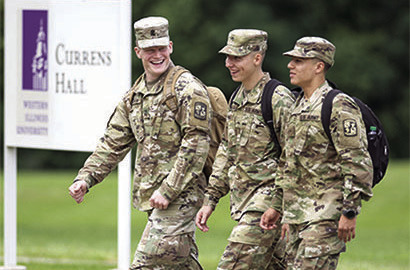MACOMB – According to an internal memo sent to Western Illinois University faculty, staff and students on June 27, the University was informed earlier that day by the Department of the Army that WIU's Reserve Officers Training Corps (ROTC) program, which currently enrolls 44 students, is one of 10 programs in the U.S. that will be discontinued by the end of the Spring 2026 semester.
The U.S. Army website shows that Western is the only Illinois program being discontinued, with three others located in the Midwest – University of Northern Iowa, Truman State University and University of Wisconsin-Oshkosh – also being eliminated. Two other Illinois programs – Northern Illinois University and Loyola University – will remain active; however, the programs will be reclassified as extension units. As an extension unit, cadre members will remain on the Northern and Loyola campuses and cadets will continue receiving training and education there, but the program will merge administrative and logistical support with a retained host unit.
'We are disappointed by this unexpected decision by the Department of the Army,' said WIU President Kristi Mindrup said in the June 27 email. 'We will continue to advocate on behalf of our students and the ROTC program, and our health and wellness teams in the University Counseling Center and Student Development and Success Center are available to support students who may be struggling with the unexpected news.

'Western Illinois University is a great place to learn and grow, thanks in part to the engagement and contributions of our active duty and veteran students,' she added. 'We are proud of our long history of being recognized as a military- friendly university. Western Illinois University will continue to engage in discussions around the Department of the Army's decision to discontinue ROTC and will work closely with students, staff, and impacted stakeholders.'
Established in 1968 by WWI Veteran Col. Leo W. Manning, Western's military science department has a longstanding tradition of excellence, having been named the recipient of the General Douglas MacArthur Award for the best ROTC battalion in the Midwest in the 1990s and early 2000s. On average, Western's military science department produces 20 new commissionees a year to active and reserve duty. Thousands of cadets have been commissioned through WIU ROTC since 1970.
The Community News Brief reached out to University Spokesperson Zach Messersmith by email with additional follow-up questions, including any reasoning provided by the Department of Defense to eliminate WIU's storied program. Messersmith provided the following statement: 'Western Illinois University is disappointed by this unexpected decision by the Department of the Army to eliminate the ROTC program at WIU. We will continue to advocate on behalf of our students and the ROTC program by engaging with our elected officials and military personnel. We are proud of the hundreds of military officers our ROTC program has developed for our nation since the inception of our program. A change to our ROTC program does not impact our commitment to be a military and veteran friendly higher education institution.'
Ret. Lt. Col. Mick Cumbie, who served as the chair of the WIU Military Science Department and ROTC program from 2001-2006, called the Army's decision to close Western's ROTC program 'enormously heartbreaking.'
'I am especially troubled by the way the Army reached this decision – without advanced warning or consultation with any of the impacted ROTC programs. It is important to note that the Army's action appears designed to meet DOGE directed civilian personnel cuts and is not a reflection on the impacted ROTC programs,' Cumbie stated. 'WIU's ROTC program served the Army well for 57 years and Leathernecks everywhere should be justifiably proud of that legacy.'
According to a June 27 story on the U.S. Army website (tinyurl.com/y4ca4k7h): 'In alignment with the principles of the Army Transformation Initiative, U.S. Army Cadet Command is implementing a strategic rebalance and optimization of the Senior ROTC program. These adjustments will optimize resources, improve operational effectiveness, and maintain the Army’s commitment to recruiting, training and commissioning high-quality officers for the Total Army.'
The Department of Defense's Deferred Resignation Program, Cadet Command reduced its civilian workforce by 168 positions, or approximately 12 percent of its authorized workforce. The story noted these reductions 'prompted a reassessment of the ROTC footprint to ensure continued mission success while operating with fewer civilian personnel.' The 'rebalancing' includes the inactivation of the 1st Brigade headquarters at Fort Knox and the inactivation, reclassification and merger of select ROTC units around the country.
'These changes will improve efficiency by consolidating and restructuring select host and extension units while preserving access to ROTC programs on approximately 900 campuses nationwide,' the story outlined. 'The initiative prioritizes reversibility, allowing the Army to scale officer production as necessary in the future while avoiding hollow units. This improves Army readiness by reallocating senior officers and non-commissioned officers to other Army priorities' A Look Back at ROTC at WIU
In addition to bringing home numerous awards and commissioning officers for the U.S. Army, Western's Military Science Department and its ROTC program is part of the country's tumultuous history during the Vietnam War.
Shortly after the Kent State shooting by the National Guard of protesters on May 4, 1970, protests erupted throughout the U.S., including at WIU. Simpkins Hall – which housed WIU's ROTC program at the time – was directly involved. A week after the Kent State massacre, 1,000 Western students marched from dorm to dorm chanting anti-war slogans. The march ended at Simpkins, with around 500 students occupying the building and ROTC offices for five days. Former student Ombudsman, the late Don Daudelin, was allowed into building to serve as the mediator between the University administration and law enforcement and the students.
'During the rally at the Union, demonstrators surrounded a Marine recruitment booth and attempted to destroy materials on display there. In addition, demonstrators doused a car belonging to one of the recruiters with gasoline and set it on fire. The fire was quickly extinguished, and only minor damage resulted,' according to a 2017 story from WIU's alumni magazine.
On Wednesday, May 6, two days after the occupation of the ROTC program, President Bernhard announced Wednesday would be a 'Day of Conscience' for Western students, assuring them he shared their rage over the tragedy at Kent State. However, Illinois Gov. Richard Ogilvie also ordered National Guard troops stationed at a number of state schools to protect life and property. In Macomb, the National Guard was on alert, but was never called upon. By Thursday, May 7, several hundred veterans and other students organized a countermarch and around the Macomb square, and members of the WIU Vets Club campaigned in support of the ROTC and organized visits to campus residence halls to talk to student voters.
The climax to the week of protests came before dawn Friday, May 8. By that time, opposition to the ROTC program had been defeated by a 2-1 vote in a hastily-called referendum. With police and national guardsmen poised to evict the protestors from Simpkins Hall later that day, WIU's Vice President Richard Poll informed the students of the penalties if they failed to withdraw, and rejected most of their demands, including the one to close WIU. After learning of the results of the referendum, many students left Simpkins Hall.
Around 3 a.m., Daudlin reported to those remaining that Poll had denied all but two of their demands: halting the practice of reporting dismissals of students more than once a year and establishing a Peace Center. At that point, the 250 remaining protestors rose from the floor of the Simpkins Hall gym and peacefully filed out of the building. As one WIU alumnus recalled, 'the atmosphere here was just electric during those days of the Simpkins occupation.'








